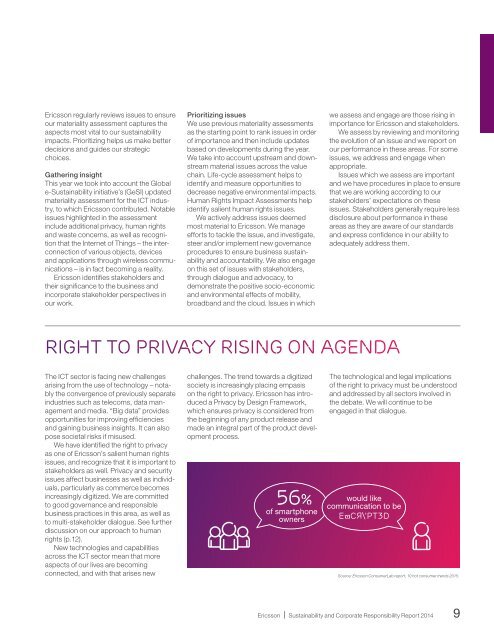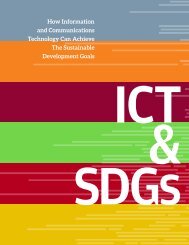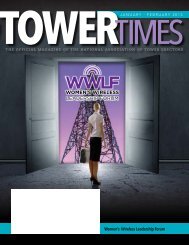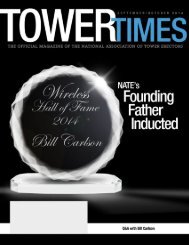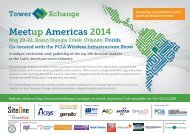Ou7h5
Ou7h5
Ou7h5
Create successful ePaper yourself
Turn your PDF publications into a flip-book with our unique Google optimized e-Paper software.
Ericsson regularly reviews issues to ensureour materiality assessment captures theaspects most vital to our sustainabilityimpacts. Prioritizing helps us make betterdecisions and guides our strategicchoices.Gathering insightThis year we took into account the Globale-Sustainability initiative’s (GeSI) updatedmateriality assessment for the ICT industry,to which Ericsson contributed. Notableissues highlighted in the assessmentinclude additional privacy, human rightsand waste concerns, as well as recognitionthat the Internet of Things – the interconnectionof various objects, devicesand applications through wireless communications– is in fact becoming a reality.Ericsson identifies stakeholders andtheir significance to the business andincorporate stakeholder perspectives inour work.Prioritizing issuesWe use previous materiality assessmentsas the starting point to rank issues in orderof importance and then include updatesbased on developments during the year.We take into account upstream and downstreammaterial issues across the valuechain. Life-cycle assessment helps toidentify and measure opportunities todecrease negative environmental impacts.Human Rights Impact Assessments helpidentify salient human rights issues.We actively address issues deemedmost material to Ericsson. We manageefforts to tackle the issue, and investigate,steer and/or implement new governanceprocedures to ensure business sustainabilityand accountability. We also engageon this set of issues with stakeholders,through dialogue and advocacy, todemonstrate the positive socio-economicand environmental effects of mobility,broadband and the cloud. Issues in whichwe assess and engage are those rising inimportance for Ericsson and stakeholders.We assess by reviewing and monitoringthe evolution of an issue and we report onour performance in these areas. For someissues, we address and engage whenappropriate.Issues which we assess are importantand we have procedures in place to ensurethat we are working according to ourstakeholders’ expectations on theseissues. Stakeholders generally require lessdisclosure about performance in theseareas as they are aware of our standardsand express confidence in our ability toadequately address them.Right to privacy rising on agendaThe ICT sector is facing new challengesarising from the use of technology – notablythe convergence of previously separateindustries such as telecoms, data managementand media. “Big data” providesopportunities for improving efficienciesand gaining business insights. It can alsopose societal risks if misused.We have identified the right to privacyas one of Ericsson’s salient human rightsissues, and recognize that it is important tostakeholders as well. Privacy and securityissues affect businesses as well as individuals,particularly as commerce becomesincreasingly digitized. We are committedto good governance and responsiblebusiness practices in this area, as well asto multi-stakeholder dialogue. See furtherdiscussion on our approach to humanrights (p.12).New technologies and capabilitiesacross the ICT sector mean that moreaspects of our lives are becomingconnected, and with that arises newchallenges. The trend towards a digitizedsociety is increasingly placing empasison the right to privacy. Ericsson has introduceda Privacy by Design Framework,which ensures privacy is considered fromthe beginning of any product release andmade an integral part of the product developmentprocess.56%of smartphoneownersThe technological and legal implicationsof the right to privacy must be understoodand addressed by all sectors involved inthe debate. We will continue to beengaged in that dialogue.would likecommunication to beEπC \’PT3dSource: Ericsson ConsumerLab report, 10 hot consumer trends 2015.Ericsson | Sustainability and Corporate Responsibility Report 20149


